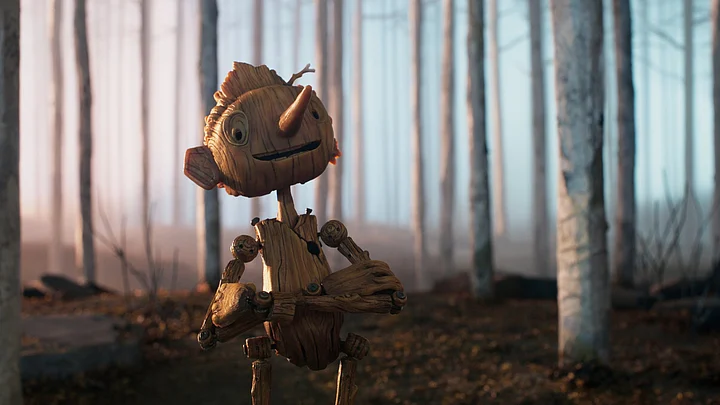Guillermo del Toro's Pinocchio lays its foundation on Carlo Collodi’s original fable. However, the narrative takes its own flight. Except for staying true to the bare bones of the original, del Toro creates his version of the tale. Reminiscent of his earlier works, such as Pan’s Labyrinth (2006), The Devil’s Backbone (2001), and Cronos (1992), he again attempts to recreate a sinister tale with a child as the protagonist in the backdrop of Fascist Italy.
Del Toro Redefines His Love For Outcasts
Del Toro's affection for outcasts filters into his take on Pinocchio as well. In his story, the titular character is carved by a drunken Geppetto, who obsessively wishes for his dead son, Carlo, to return. The scene is sequenced to showcase a lab experiment gone wrong – complete with haunting shadows of Geppetto in a drunken stupor hammering away to carve his dead son, who will never return.
But perhaps, it’s the mercy of del Toro’s narratives that even in grief there can be grace. Pinnochio is gifted to Geppetto when he is at his worst – when most would shrink away – someone decides to be kind.
Moreover, it’s not by accident that Pinnochio’s creation reminds us of Marry Shelly’s Frankenstein. Both narratives have similarities – both creatures were misunderstood and did the best they could given the circumstances. For instance, most hurl abuses at Pinocchio when he disobeys Geppetto and comes to church. He is quickly relegated to the margins.
Disobedience As A Virtue
But the heart of the tale is the potentiality of disobedience. Del toro shifts his gaze from the burden of obeying to the freedom of being human despite hurdles. In the film, Pinnochio will continue to disobey – he will be misled, misunderstood, used and battered but he will continue to persevere.
Pinnochio's resolve reminds us of Ofelia from Pan’s Labyrinth or Carlos from The Devil’s Backbone – their curiosity and innocence are in parallel to the backdrop of war – starkly in contrast to how the adults are acting. All three narratives are complete with ghosts, monsters and creatures – guiding them as they falter – in del Toro’s narrative, they are never an adversary, always a friend.
Pinocchio Is More Than Just a Puppet
The enemy in del Toro’s films is often lying in plain sight, they are domesticated and never disobey. In Pinnochio, it’s the fascist regime that has created a herd out of a community, and its railing against this structural oppression, not by device but by accident, highlighting that oppression comes in all shapes and sizes. They are often in the rules we swear by, and in the obedience of doing what we are asked to do. It’s perhaps, in the death of child-like curiosity.
Pinocchio, Ofelia and Carlos find themselves in similar terrains. And although Pinocchio is packaged as a comedy and the other two are more gothic in their visualisation – they all share the gift of disobedience.
The film touches upon themes of grief, virtue and what it means to be human. In this world, del Toro’s narrative yet again finds a silver lining in the worst of times. Pinocchio finds refuge in the idea of helping his father, Gepetto finds mercy in finding Pinocchio and most of all, through their journey, they find kind souls to guide them. Unlike in some of del Toro’s recent films – Nightmare Alley (2012) and Crimson Peak (2015) – there is hope.
In an earlier interview with Vanity Fair, del Toro says, “At a time when everybody else behaves as a puppet—he (Pinocchio) doesn’t.” And the moral underpinnings of the original tale are subverted. He tailors a story of compassion and endurance during a time of horror. But unlike in his other films, it is humorous – it can laugh at itself and mourn when necessary. The universality of the film is that Pinocchio doesn’t embark on a crusade he stumbles upon it and resolves to do his best.
